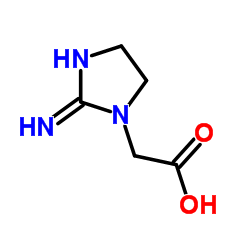Cyclocreatine inhibits stimulated motility in tumor cells possessing creatine kinase.
P T Mulvaney, M L Stracke, S W Nam, E Woodhouse, M O'Keefe, T Clair, L A Liotta, R Khaddurah-Daouk, E Schiffmann
Index: Int. J. Cancer 78(1) , 46-52, (1998)
Full Text: HTML
Abstract
Cyclocreatine (1-carboxymethyl-2-iminoimidazolidine), an analog of creatine and a substrate for creatine kinase (EC 2.7.3.2), inhibits the stimulated motility of tumor cells which possess creatine kinase. A2058-055 human melanoma cells, transfected with a creatine kinase gene, showed an 80-90% reduction in chemotactic response to type IV collagen when incubated overnight in the presence of 10 mM cyclocreatine (p < 0.0001 for n = 8 experiments). This inhibitory effect of cyclocreatine can be partially reversed by addition of creatine to the overnight cell treatment. Non-transfected cells, with very low levels of creatine kinase, were not significantly inhibited. Further experiments utilizing type IV collagen as attractant demonstrated that cyclocreatine inhibited the chemokinetic (91%) and the haptotactic (73%) responses and the in vitro invasion of A2058-055 cells through Matrigel-coated membranes (88%). In addition, motility stimulation of A2058-055 cells by either autotaxin or fibronectin was markedly inhibited by cyclocreatine. DU-145 prostatic tumor cells, which express endogenous creatine kinase, also have a reduced motility response to either autotaxin or epidermal growth factor induced motility in the presence of cyclocreatine.
Related Compounds
| Structure | Name/CAS No. | Molecular Formula | Articles |
|---|---|---|---|
 |
(2-Iminoimidazolidin-1-yl)acetic acid
CAS:35404-50-3 |
C5H9N3O2 |
|
Synergistic action of dendritic mitochondria and creatine ki...
2015-04-08 [J. Neurosci. 35(14) , 5707-23, (2015)] |
|
Pharmacological identification of a guanidine-containing β-a...
2014-10-01 [Neurochem. Res. 39(10) , 1988-96, (2014)] |
|
Differential effects of creatine kinase isoenzymes and subst...
1997-08-01 [Am. J. Physiol. 273(2 Pt 1) , C741-6, (1997)] |
|
Critical role of phosphagens in the energy cascade of cutane...
1998-05-01 [Plast. Reconstr. Surg. 101(6) , 1597-603, (1998)] |
|
Mutagenesis of two acidic active site residues in human musc...
2001-03-13 [Biochemistry 40(10) , 3056-61, (2001)] |